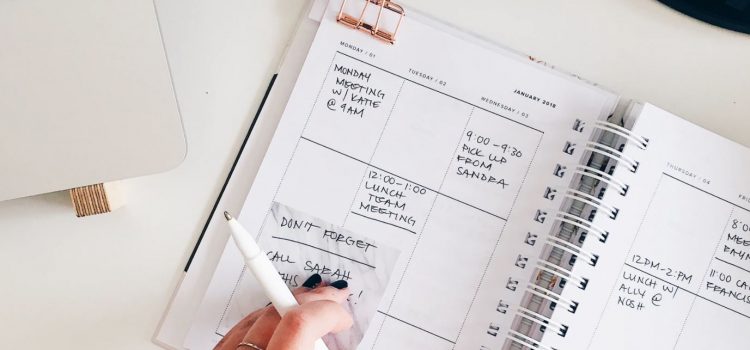

This article is an excerpt from the Shortform book guide to "How to Become a Straight-A Student" by Cal Newport. Shortform has the world's best summaries and analyses of books you should be reading.
Like this article? Sign up for a free trial here.
Why should you make a studying schedule? Will a schedule affect your grades?
It’s easy to say you’ll focus, but it’s a lot harder to do it when you’re constantly procrastinating. In How to Become a Straight-A Student, Cal Newport teaches you how to make a studying schedule so you can fit in all your studying.
Read below for Newport’s tips on overcoming procrastination with a study schedule.
How to Plan Your Day
Newport contends that if you want to do well in college, you must plan your day effectively. Why does learning how to make a studying schedule matter? If you don’t have a plan, your brain is constantly distracted by incomplete tasks so you can’t give your assignments your full attention. In contrast, when you have a plan, you forget about these other tasks and can concentrate on the task at hand—whether that’s editing your paper or enjoying lunch with a friend.
But how exactly should you plan your day? Newport presents a method tailored to the ever-changing schedules of college students. To use it, you’ll need two items: a calendar and a list. The calendar should be large enough that you can fit several items in each day and can be left in your room. The list is a piece of paper you need to carry around. Divide your list into two columns titled “Schedule” and “To Remember.”
Newport’s plan is a cyclical system—so for clarity, we’ll describe his first step as if you’re already following it.
Step 1: Update your calendar. Each morning, look at the “To Remember” column of yesterday’s list. This includes any tasks or commitments you noted the previous day. Add each to your calendar, assigning days to tasks that don’t already have a designated time, like “Research English paper topic.”
Step 2: Write your schedule. In the “Schedule” column of today’s list, write down any non-negotiable commitments (like your classes). Then, look at today’s calendar. In order of priority, write down a time slot for the tasks listed on your calendar in your “Schedule” column. Be realistic: Allow yourself enough time to complete each project, eat well, and sleep at reasonable hours. Once your schedule is full, move the remaining tasks on your calendar to another day.
Not sure when to schedule a study session? Newport recommends that you do it before dinner. Most students try to study at night, but this is both prime socialization time and the period during which you have the least energy. Instead, take advantage of the small breaks in your day—like if you have 45 minutes between classes. Select several secluded places on campus where you can go to focus on your studies and spend time studying in those places alone before dinner so you can socialize afterward.
(Shortform note: Newport makes similar recommendations for knowledge workers in Deep Work. He suggests starting to do deep work about an hour at a time, since that’s the maximum time that most beginners can focus, and selecting spaces in which you only do deep work to cement the habit of deep work there more strongly. However, even with solid deep work habits, you may not get all your work done before dinner, as Newport advises you to do. Don’t worry: Many adolescents are predisposed to sleeping later—so nighttime may be good for both socializing and focused work.)
Of course, some days will require longer periods of work. But even then, Newport warns against scheduling hours of nonstop work, which will fatigue you and make you less efficient. Instead, once you’ve worked for about an hour, take a five- to 10-minute break. Research suggests this schedule will allow you to learn the most.
Step 3: Adjust your schedule as necessary. Your schedule is a guideline, not an unbreakable rule, asserts Newport—so while you should generally stick to your schedule, you can adjust it as needed. For example, say you’ve scheduled a pre-lunch study session from 11 a.m. to 1 p.m. but get invited to lunch at noon. Shuffle your schedule around so that you work from 11 a.m. to 12 p.m., have an hour-long lunch break at noon, and study when you were initially supposed to have lunch instead.
Step 4: Fill in your list. As you go about your day, each time you encounter a new task or commitment—like a party you want to go to or a deadline you must meet—write it down in your “To Remember” column. By doing so, you’ll remove the task from your brain so that you can focus on other things and still be sure that you’ll schedule it tomorrow morning when you return to Step 1.
How to Study When You Say You Will
You’ve now learned how to create a flexible schedule and how to adjust it effectively as new commitments arise. But scheduling your study sessions won’t help you get good grades if you procrastinate when you’re supposed to be studying. So how do you stop putting your work off? Newport shares several strategies to help you avoid giving in to this temptation.
First, he recommends that you take care of your body so that you have enough energy to focus on the task at hand. Notably, stay hydrated: Drink lots of water to help you stay awake, limiting caffeinated beverages to one per hour so you don’t get jittery. You should also eat regularly. Low blood sugar diminishes your focus, so eat proper meals and healthy snacks that will keep you energized. Skip foods that will give you a sugar crash, like a chocolate chip cookie.
Second, Newport recommends that you schedule recurring study sessions. For each weekday, find an hour that’s consistently free, and do the same type of work each time. For example, you might write your weekly Spanish essays every Tuesday at 11 a.m. These can’t be your only study sessions. However, by repeatedly scheduling the same activity in the same way, you’ll turn doing this work into a habit and will be less likely to procrastinate on it.
Third, Newport recommends planning ahead for difficult weeks. You’ll inevitably encounter some periods that are particularly academically demanding—like if you have two papers due the same week—and thus require you to spend a few days holed up in the library. But spending several consecutive days focused solely on academics is exhausting. By scheduling these work-intensive days well before your deadline, you give yourself breathing room so you’re not forced to do two in a row and thus can conserve mental energy. For best results, broadcast to your friends how much work you’ll be doing on that day; doing so will create social pressure for you to work when the day comes.
Fourth, Newport recommends that you create a procrastination tracker to keep near your calendar. Each morning, write down your high-priority tasks. When evening comes, write down whether you’ve completed each task—and if you haven’t, write down why not. If you’ve put off a task for a weak reason, like that you wanted to watch Netflix instead, seeing that reason on paper will highlight its weakness in a way that merely thinking about it doesn’t—and will thus make you feel bad. In this way, the procrastination tracker motivates you to avoid this discomfort and do the work you’ve scheduled.

———End of Preview———
Like what you just read? Read the rest of the world's best book summary and analysis of Cal Newport's "How to Become a Straight-A Student" at Shortform.
Here's what you'll find in our full How to Become a Straight-A Student summary:
- How to ace your college courses with just a few hours of studying each day
- How to combat procrastination and write better papers
- Study methods to prepare for different types of exams






